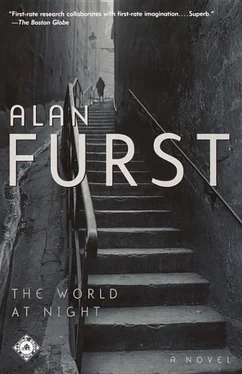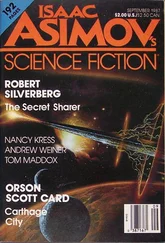Alan Furst - The World at Night
Здесь есть возможность читать онлайн «Alan Furst - The World at Night» весь текст электронной книги совершенно бесплатно (целиком полную версию без сокращений). В некоторых случаях можно слушать аудио, скачать через торрент в формате fb2 и присутствует краткое содержание. Жанр: Шпионский детектив, на английском языке. Описание произведения, (предисловие) а так же отзывы посетителей доступны на портале библиотеки ЛибКат.
- Название:The World at Night
- Автор:
- Жанр:
- Год:неизвестен
- ISBN:нет данных
- Рейтинг книги:5 / 5. Голосов: 1
-
Избранное:Добавить в избранное
- Отзывы:
-
Ваша оценка:
- 100
- 1
- 2
- 3
- 4
- 5
The World at Night: краткое содержание, описание и аннотация
Предлагаем к чтению аннотацию, описание, краткое содержание или предисловие (зависит от того, что написал сам автор книги «The World at Night»). Если вы не нашли необходимую информацию о книге — напишите в комментариях, мы постараемся отыскать её.
The World at Night — читать онлайн бесплатно полную книгу (весь текст) целиком
Ниже представлен текст книги, разбитый по страницам. Система сохранения места последней прочитанной страницы, позволяет с удобством читать онлайн бесплатно книгу «The World at Night», без необходимости каждый раз заново искать на чём Вы остановились. Поставьте закладку, и сможете в любой момент перейти на страницу, на которой закончили чтение.
Интервал:
Закладка:
It was a close guess-only a few seconds off. A whistle blew, the Germans came out of the forest. The German tanks fired-orange flashes in the trees-and French antitank cannon fired back from the other blockhouses. The German infantry yelled and cheered, hundreds of them, running down the meadow carrying rubber boats and paddles. Clearly it was something they’d drilled at endlessly-it was synchronized, rehearsed. It reminded Casson of the news footage of gymnastic youth; throwing balls in the air or waving ribbons in time to music. Casson could hear the officers shouting, encouraging the soldiers. Some of the men reached the bank of the river and held the boats so their comrades could climb in.
The Hotchkiss guns opened up, tracer sailing away into the far bank and the troops boarding the rafts. German machine guns answered- fiery red tracer that seemed slow at first, then fast. Some of it came through the slits, fizzing and hissing in the blockhouse with the smell of burnt steel. The French gunners worked hard, slamming the short clips into the guns and ripping them out when they were done. On the far bank of the river, some soldiers bowed, others sat down, rolling on the ground or curling up.
Then it stopped. A few rubber boats turned in the current as they floated away, a few gray shapes floated along with them. The silence seemed strange and heavy. Casson let the binoculars hang on their strap and leaned against the lip of the gunport. Just outside, he heard twigs snapping and pounding footsteps on the dirt path. Two French soldiers ran past, then three more. The sergeant swore and hurried outside. Casson heard his voice. “Stop,” he called out. “You cannot do this-go back where you belong.”
The answering voice was cold. “Get out of the way,” it said.
At dusk, a message on the field telephone: the unit had been ordered out. Degrave’s allies in Paris, Casson suspected, knew the battlefield situation for what it was and had determined to save a friend’s life. “We’re being sent south,” Degrave explained as they packed up the equipment. “To the reserve divisions behind the Maginot Line.”
They tried. But in the darkness on the roads leading out of Sedan nobody was going anywhere. Thousands of French troops had deserted, their weapons thrown away. They trudged south, eyes down, among columns of refugees, most of them on foot, some pushing baby carriages piled high with suitcases. Casson saw artillery wagons-the cannon thrown off, soldiers riding in their place-pulled by farm horses; an oxcart carrying a harp, a hearse from Mons, a city bus from Dinant, the fire truck from Namur. Sometimes an army command car forced its way through, packed with senior officers, faces rigid, sitting at attention while the driver pounded on the horn and swore. Let us through, we’re important people, retreating in an important fashion. Or, as a soldier riding on Casson’s running board put it, “Make way, make way, it’s the fucking king.” Then, a little later, as though to himself, he said “Poor France.”
Casson and the others moved slowly south, at walking speed. Back on the Meuse, the Wehrmacht was attacking again and whatever remained of the Forty-fifth Division was fighting back-floods of orange tracer crisscrossed the night sky above the river.
It was hard work, coaxing the truck forward among the refugees. They slept for an hour, then started up again. In first light, just after dawn, Casson spotted a road marker and realized they’d traveled less than twenty miles from Sedan. And then, prompt to the minute at 7:00 A.M., the Stukas came to work. They were very diligent, thorough and efficient, taking care to visit each military vehicle. Casson ran for the ditch and up went the truck-gasoline, cameras, film stock, canned lentils. He sat in the dirt and watched it burn, caught up in a fury that amazed him. It made no sense at all-they’d stopped him from making idiotic newsreels that nobody would ever see-but something inside him didn’t like it.
But, whether he liked it or not, that was the end of the Section Cinematographique of the Forty-fifth Division, decommissioned in a cow pasture near the village of Bouvellement on a fine May morning in 1940. The Peugeot had also been a victim of the Stukas, though it had not burned dramatically like the truck. A heavy-caliber bullet had punched through the engine, which could do no more than cough and dribble oil when Degrave tried the ignition. “Well,” he said with a sigh, “that’s that.”
He then gave Meneval and Casson permission to go, filling out official little slips of paper that said they’d been granted emergency leave. For himself, he would make his way to the military airfield at Vouziers, not all that far away, and request reassignment.
Meneval said he would leave immediately for home, just outside Paris. His family needed him, especially his wife, who’d been absolutely certain that he was gone forever.
“You understand,” Degrave said, “that the fighting is going in that direction.”
“Yes, probably it’s not for the best,” Meneval said gloomily. “But, even so.” He shook hands and said good-bye and headed for the road.
Degrave turned to Casson. “And you, Corporal?”
“I’m not sure,” Casson said.
“What I would recommend,” Degrave said, “is that you make your way to Macon. There’s a small army base north of the city-it’s the Tenth Division of the XIV Corps. Ask for Captain Leduc, mention my name, tell him you are an isolee- a soldier separated from his unit. They’ll give you something to eat and a place to sleep, and you’ll be out of the way of, of whatever’s going to happen next.”
He paused a moment. “If the Germans ask, Corporal, it might be better not to mention that you were recalled to service. Or what you did. Other than that, I want to thank you, and to wish you luck.”
Casson saluted. Degrave returned the salute. Then they shook hands. “We did the best we could,” Degrave said.
“Yes,” Casson said. “Good luck, Captain.”
Casson headed for Macon. Sometimes, in a cafe, he heard the news on a radio. Nothing, he realized, could save them from losing the war. He left the roads, walked across the springtime fields. He ate bread he found in a bombed bakery in Chalons, tins of sardines a kind woman gave him in Chaumont. He was not always alone. He walked with peasant boys who’d run away from their units. He shared a campfire with an old man with a white beard, a sculptor, he said, from Brittany somewhere, who walked with a stick, and got drunk on some bright yellow stuff he drank from a square bottle, then sang a song about Natalie from Nantes.
As Casson watched, the country died. He saw a granary looted, a farmhouse burned by men in a truck, a crowd of prisoners in gray behind barbed wire. “We’ll all live deep down, now,” the sculptor said, throwing a stick of wood on the fire. “Twenty ways to prepare a crayfish. Or, you know, chess. Sanskrit poetry. It will hurt like hell, sonny, you’ll see.”
The villages were quiet, south of Dijon. The spaniel slept in the midday heat, the men were in the cafes at dusk, the breeze was soft in the faded light that led to evening, and the moon rose as it always had.
THE ADE PAGODA
20 August, 1940.
The silence of the empty apartment rang in his ears. The bed had been made-the concierge’s sister coming in to clean as she always did-and the only sign of his long absence was a dead fern. Still, he felt like a ghost returning to a former life. And he had to put the fern outside the door so he wouldn’t see it.
The heat was almost liquid. He opened the doors to the little balcony but it wasn’t all that much better outside. Hot, and wet. And still-as though all the people had gone away. Which they had, he realized. Either fled before the advancing Wehrmacht in June, or fled to the seashore on the first of August. Or both. Practical people on the rue Chardin.
Читать дальшеИнтервал:
Закладка:
Похожие книги на «The World at Night»
Представляем Вашему вниманию похожие книги на «The World at Night» списком для выбора. Мы отобрали схожую по названию и смыслу литературу в надежде предоставить читателям больше вариантов отыскать новые, интересные, ещё непрочитанные произведения.
Обсуждение, отзывы о книге «The World at Night» и просто собственные мнения читателей. Оставьте ваши комментарии, напишите, что Вы думаете о произведении, его смысле или главных героях. Укажите что конкретно понравилось, а что нет, и почему Вы так считаете.












